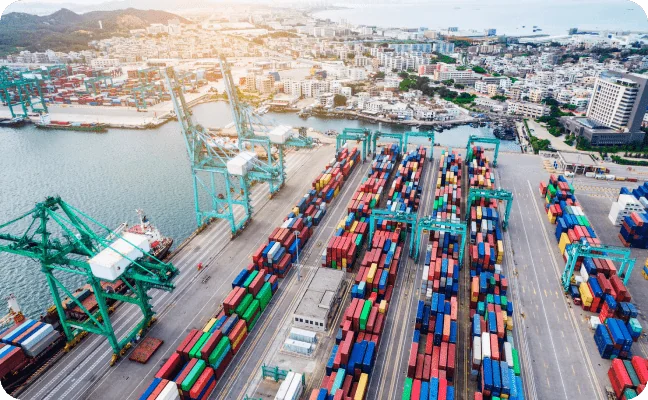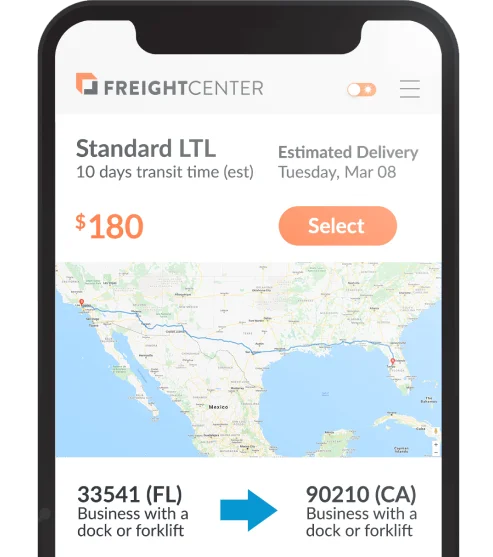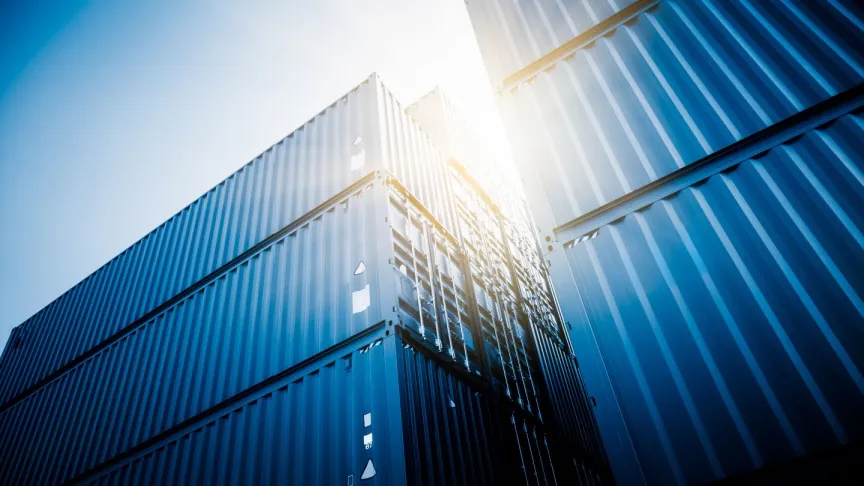
Rail Freight
FreightCenter offers reliable and cost-effective rail shipping solutions for all types of freight. Get instant quotes and compare rates from top carriers today.
What Is a Rail Shipping?
Rail shipping refers to transporting goods and commodities via railroads using trains. Rail shipping can be a cost-effective and efficient way to move large quantities of goods over long distances. It is commonly used for transporting heavy and bulky items, such as raw materials, coal, and finished products like cars and electronics. Rail shipping is often used for intermodal transportation, where goods are transferred between different modes of transportation, such as trucks, trains, and ships.
How FreightCenter Can Help
FreightCenter can help with your rail freight needs by providing you access to a network of reliable rail carriers at competitive rates. We can help you with everything from finding the best carrier for your specific needs to tracking your shipment throughout transportation. Our user-friendly platform and expert customer support team make it easy to manage your rail shipments from start to finish.
Trust FreightCenter to help you manage all your rail freight needs. With FreightCenter, you can easily compare rates and transit times from multiple rail carriers, ensuring you get the best service at the best price. We offer various rail services, including intermodal, heavy haul, and specialized freight. Whether you need to move freight across the country or just a few states over, we can help you find a cost-effective and efficient rail shipping solution.
Thousands of businesses trust FreightCenter to move their freight faster, smarter, and cheaper! From unbeatable rates to top-notch service, our customers are raving about their shipping success.
See why they keep coming back!
Award-Winning Service, Trusted by Shippers Everywhere!
- 2021, 2017 & 2016 Food Logistics’ Top Green Providers
- 2021 & 2018 Supply & Demand Chain Executives’ Pros to Know: Matthew Brosious
- 2020 & 2019 Top Food Logistics’ 3PL & Cold Storage Provider Award
- 2020 & 2019 Business Observer’s Top 500 Companies on the Gulf Coast
- 2020 & 2017 SmartWay® Transport Partner
- 2020 & 2017 Food Logistics’ Champions: Rock Stars of the Supply Chain
- 2020 Best of Palm Harbor Awards for Local Businesses
- 2017 Green Supply Chain Award from Supply & Demand Chain Executive
- 2017 Tampa Bay Business Journal Heroes at Work
- 2016, 2015, & 2012 Food Logistics Top 100 Software and Technology Providers
- 2013 Tampa Bay Business 100 by Tampa Bay Business Journal
- 2013 Top 100 Great Supply Chain Partners by SupplyChainBrain
- 2012 TIA Samaritan Award Honorable Mention
- 2012, 2011 & 2010 TBBJ Fast 50 Recipient
- 2013, 2011, & 2010 Diversity Business Top Businesses

Why Choose FreightCenter For Container Rail Shipping?
FreightCenter is a reliable and efficient solution for rail freight shipping. Our platform offers access to a wide network of rail carriers, allowing us to find the best rates and services for your specific needs. We also provide you with a single point of contact for all your rail freight needs, simplifying the shipping process and providing peace of mind.
In addition, FreightCenter offers advanced tracking and reporting tools to help you stay informed about the status of your rail shipment at all times. Our team of dedicated logistics experts is available to answer any questions you may have and provide you with top-notch customer service. With FreightCenter, you can trust that your rail freight shipment will be handled with care and delivered on time.
Rail Freight Shipping
Rail freight shipping can be an efficient and cost-effective way to transport large quantities of goods over land. However, coordinating rail shipments and navigating the various logistics involved can be challenging. At FreightCenter, we offer rail shipping solutions that take the hassle out of the process. With our experience and industry connections, we can help you find the right carrier, negotiate rates, and manage all the details of your rail freight shipments.
Whether you need to move a single rail car or an entire trainload of freight, we have the expertise and resources to get your shipment where it needs to go. Our comprehensive rail shipping services include everything from arranging pick-up and delivery to handling all necessary documentation and customs clearance. With FreightCenter, you can trust that your rail freight is in good hands and that you’ll receive the best possible rates and customer service. Contact us today to learn more about our rail shipping solutions.
Steps To Ship A Container?
Container freight often entails more than one form of conveyance, making it a tall order for an infrequent shipper to arrange. Infrequent shippers rely on 3PLs (3rd Party Logistics companies) like FreightCenter to arrange to ship with the carrier(s that provide the best combination of rate and service. Carriers prefer to work with companies that sign a long-term contract guaranteeing a minimum number of shipments.
Shipping container freight can seem overwhelming if you’re new to it, but it’s a straightforward process that involves the following steps:
- Determine your shipping needs: Decide on the type of cargo you need to ship, the volume of cargo, the destination, and the timeline for delivery. This information will help you choose the right container size and shipping method.
- Get a freight quote: Contact a freight forwarder or shipping company for a container shipping quote. You’ll need to provide information about the cargo, the origin and destination, and any special requirements.
- Choose a container size: Based on the volume of cargo you need to ship, choose a size that best fits your needs. Standard container sizes are 20 feet, 40 feet, and 45 feet.
- Book your shipment: Once you’ve received a quote and chosen a container size, book your shipment with the freight forwarder or shipping company. You must provide details about the cargo, pickup, delivery locations, and special requirements.
- Prepare the cargo: Pack your cargo securely in the container, making sure it is appropriately labeled and any necessary customs documentation is completed.
- Transport the container: The shipping company will transport the container to the port and load it onto the ship. Once it reaches the destination port, it will be unloaded and transported to the final destination.
- Receive your cargo: Once the container arrives at the destination port, you’ll need to arrange for customs clearance and for the container to be delivered to the final destination.
Overall, shipping container freight involves careful planning, preparation, and coordination with the shipping company, but it can be a reliable and low-cost way to transport goods across long distances.
How to Save Money on Shipping Container Freight?
Rely on FreightCenter
FreightCenter can help save you money when shipping container freight in a few ways:
Carrier network: FreightCenter has partnerships with a wide range of carriers, which allows them to compare rates and find the most cost-effective shipping option for your specific needs.
Advanced technology: FreightCenter’s technology-driven approach helps to streamline the shipping process, reducing the risk of errors and saving time and money in the long run.
Expertise and guidance: FreightCenter’s team of shipping experts can guide everything from choosing the right container size to navigating customs regulations, which can help avoid costly mistakes and delays.
Customized solutions: FreightCenter offers customized shipping solutions based on your specific needs, whether expedited shipping, specialized handling, or other requirements. This can help to minimize costs and optimize efficiency.
Freight consolidation: FreightCenter can consolidate your cargo with other shipments going to the same destination, which can help reduce shipping costs by sharing the cost of transportation.
Overall, FreightCenter’s combination of the carrier network, advanced technology, expertise, customized solutions, and freight consolidation can help save you money when shipping container freight while still ensuring your cargo arrives at its destination safely and on time.
3PLs arrange shipping services for shippers large and small. Some 3PLs, like FreightCenter, specialize in working with small-to-medium-size businesses that do not ship frequently enough to make signing a contract with one carrier worthwhile. Because of the high volume of sending FreightCenter does, we hold heavily-discounted contracts with many carriers. Our customers enjoy the benefits of those discounts, frequently saving 25%, 50%, 75%, or more compared with booking directly through the same carrier.
FreightCenter arranges pickup and delivery of container freight, whether the mode is intermodal or international ocean cargo. We work with an extensive network of trucking and freight companies specializing in container freight shipping. Whether you have a full container load (FCL) or partial container load (PCL), our booking agents can find a suitable carrier at a great rate.
To create value for our customers by delivering customized shipping solutions that meet their unique needs and to fulfill shipping demands from simple to complex with expertise, guidance and ingenuity.
We deliver optimized solutions for full or partial truckloads and competitive dry van, flatbed, and refrigerated freight pricing. We can cover your full truckload shipping needs.
Our experienced staff will manage all the variables needed to ensure a smooth shipping and safe arrival of your less-than-truckload cargo, including coordinating pickup and delivery, customs management, and permits.
Purchasing additional freight insurance can give you added peace of mind whether you’re shipping less-than-truckload (LTL), full truckload, or partial truckload. See insurance rates for full or partial truckload freight shipping.
Trust the experts at FreightCenter to give you the best prices and the most comprehensive options for all your LTL freight shipping needs.

Rail Freight FAQs
Q. What is rail freight?
Rail freight refers to transporting goods using trains and rail infrastructure. It involves loading cargo onto railcars or containers designed for rail transportation and moving them between locations. Rail freight is commonly used for long-distance transport of bulk goods, such as commodities, minerals, chemicals, and manufactured goods.
Q. How do I determine the cost of rail freight?
The cost of rail freight depends on several factors, including the distance traveled, the weight and volume of the cargo, the type of goods being transported, the service level required, and any additional services such as door-to-door delivery. Rail freight rates are typically calculated based on factors and can be obtained from rail freight operators or logistics providers. Comparing quotes from different providers will help you determine the most cost-effective option for your shipment.
Q. What are the advantages of rail freight?
Rail freight offers several advantages:
Cost-effective: Rail transport is often more cost-effective than other modes, especially for long-distance transportation and large cargo volumes.
Fuel efficiency: Trains are more fuel-efficient than trucks, resulting in lower greenhouse gas emissions and environmental impact.
Capacity: Rail networks can handle large volumes of cargo, making it suitable for transporting bulk goods.
Reduced road congestion: Using rail transport helps alleviate congestion by shifting freight from highways to rail lines.
Safety: Rail transport has a strong safety record, with fewer accidents than other transportation modes.
Q. What types of goods are suitable for rail freight?
Rail freight is suitable for a wide range of goods, including:
Bulk commodities: Such as coal, grains, ores, minerals, and chemicals.
Intermodal containers: Goods packed in containers that can be easily transferred between rail and other modes of transportation, such as trucks or ships.
Finished goods: Products requiring long-distance transportation, such as automobiles, appliances, and electronics.
Q. How do I arrange rail freight for my cargo?
You can work with rail freight operators, logistics providers, or freight forwarders to arrange rail freight for your cargo. They can help you with the necessary arrangements, including coordinating the pickup and delivery of your shipment, providing railcar or container options, obtaining rail freight rates, and assisting with documentation and customs procedures if applicable.
Q. How long does rail freight take?
The transit time for rail freight varies depending on the distance traveled and the specific rail network. Generally, rail freight takes longer than air freight but is faster than ocean freight. Transit times can range from a few days to several weeks, depending on the origin and destination, the route, and any potential delays or congestion along the rail network.
Q. Can I track my rail freight shipment?
Yes, many rail freight operators provide tracking services that allow you to monitor the progress of your shipment. They offer online tracking systems or customer service support to update your rail freight shipment’s location and estimated arrival time. This tracking capability allows you to stay informed and plan accordingly.
Q. Are there any limitations or restrictions on rail freight?
Rail freight has certain limitations and restrictions. Some factors to consider include:
Accessibility: Rail transport requires access to rail lines and terminals, so locations far from rail infrastructure may have limited or no rail freight options.
Size and weight: Railcars and containers have specific height and weight limits. Oversized or cumbersome cargo may require specialized equipment or alternative transportation methods.
Hazardous materials: Some hazardous materials may restrict rail transport due to safety regulations. Certain classes of hazardous materials may require additional permits or precautions for rail freight.
Customization: Rail freight may need more flexibility regarding door-to-door delivery options or specific routing requests than trucking.
Q. Is insurance necessary for rail freight shipments?
While insurance is not mandatory for rail freight shipments, protecting your cargo against potential loss, damage, or theft during transit is highly recommended. Insurance coverage can be obtained through cargo insurance providers or freight forwarders. Consult with your insurance provider to understand the coverage options for rail freight shipments.
Q. Can rail freight be used for international shipments?
Rail freight can be used for international shipments, primarily land-based transportation between neighboring countries or regions. Rail networks connect many countries and provide an alternative to road or sea transport for cross-border shipments. International rail freight services may require coordination with different rail operators and adherence to international customs procedures and regulations. Working with experienced logistics providers or freight forwarders specializing in international rail freight can help facilitate smooth cross-border transportation.


